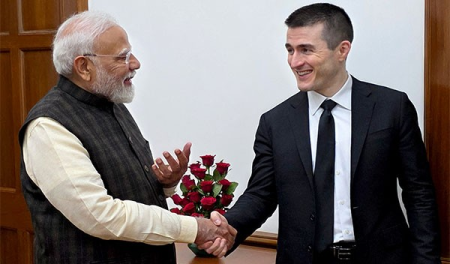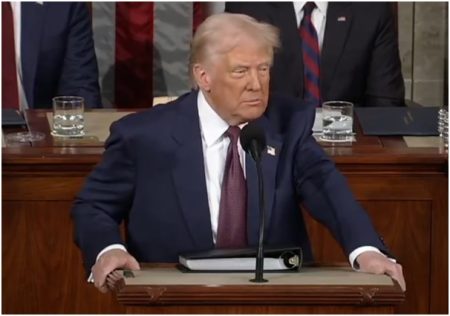
Photo Courtesy : X.com
The events surrounding the ouster of Sheikh Hasina, the former Prime Minister of Bangladesh, and the subsequent installation of Muhammad Yunus as the head of an interim government have stirred considerable controversy and raised critical questions about the extent of foreign influence in Bangladesh’s domestic affairs. As we dissect these occurrences, it becomes increasingly clear that the United States has played a significant role in shaping the political trajectory of Bangladesh, a role that bears the hallmarks of a carefully orchestrated coup rather than a natural political transition.
The Prelude to a Regime Change
Sheikh Hasina’s warning to her allies on May 24, 2024, about an imminent conspiracy against her government was more than a mere political statement; it was a reflection of the geopolitical pressures she had been under for years. Her prediction of a plot by a foreign power to remove her from office, which tragically came true, highlights the precarious nature of leadership in nations where external powers hold significant sway. The specific allegations of Hasina facing threats from U.S. representatives demanding the creation of a “Christian state” and the establishment of a U.S. military base on Saint Martin Island serve as chilling reminders of the coercive methods used to subjugate sovereign nations.
Hasina’s swift departure to India amid violent protests, which bore the markings of a well-coordinated effort to destabilize her government, signals the gravity of the situation. In reality, a coalition of actors, possibly incentivized or even orchestrated by foreign entities, backed the protests ostensibly led by students. The fact that these protests escalated so quickly and with such intensity suggests a level of organization and support that could only come from a well-resourced and determined entity—likely the U.S. State Department.
Muhammad Yunus: A Pawn or a Player?
The appointment of Muhammad Yunus as the interim leader of Bangladesh is not just a coincidence; it is a strategic move that aligns with the interests of the United States. Yunus, a Nobel Laureate and a figure with deep connections to influential American figures like Hillary Clinton and George Soros, has long been a favored candidate of the United States for leadership in Bangladesh. His history with the Clinton Foundation and his financial contributions to it position him as deeply embedded within the power networks that extend beyond Bangladesh’s borders.
The relationship between Yunus and the Clintons is emblematic of the broader issue of how personal and financial ties can influence international politics. The 2017 letter from Charles E. Grassley, Chairman of the U.S. Senate Committee on the Judiciary, to then-Secretary of State Rex Tillerson sheds light on the extent to which the Clintons were willing to leverage their power to protect Yunus. The letter’s allegations that Hillary Clinton used her position as Secretary of State to pressure the Bangladeshi government into halting a corruption investigation into Yunus underscore the intersection of personal relationships and political power.
The United States State Department’s Unseen Hand
The involvement of the U.S. State Department in Bangladesh’s political affairs, particularly in relation to the Grameen Bank investigation, reveals the lengths to which the United States will go to protect its interests and those of its allies. The pressure exerted on Sheikh Hasina’s government to drop the investigation into Yunus, as well as the subsequent threats made to her son, Sajeeb Wazed, of an IRS audit if he did not comply, are indicative of a strategy that combines diplomatic pressure with personal intimidation.
These actions are not isolated incidents but part of a broader pattern of U.S. intervention in the political processes of sovereign nations. Similar accusations of U.S. meddling in domestic affairs to install leaders more amenable to American interests recur in the case of Bangladesh. The fact that the U.S. State Department, under multiple administrations, has consistently supported Yunus, even when faced with credible allegations of financial misconduct, suggests a calculated effort to maintain influence in Bangladesh.
The Grameen Bank controversy
The Grameen Bank Commission’s findings against Yunus and his associated entities are damning. The commission’s report, which revealed significant irregularities and a lack of transparency within the Grameen Bank’s operations, stands as a stark reminder of the complexities involved in microfinance institutions that operate on a global scale. The involvement of international figures like George Soros, who provided financial backing for Yunus’ ventures, adds another layer of complexity to the situation.
The commission’s investigation into the creation of Grameen Telecom and the illegalities surrounding it further complicates Yunus’ image as a benevolent social entrepreneur. The transfer of funds between various entities associated with Yunus raises serious questions about these organizations’ governance and accountability. The commission’s recommendation to suspend Grameenphone Ltd.’s telecommunication license, though ultimately not implemented, was a clear indication of the severity of the issues at hand.
The role of George Soros
In the context of Bangladesh, we cannot overlook George Soros’ involvement, a figure often associated with using his wealth to influence political outcomes. Soros’ financial support for Yunus and his organizations, coupled with the strategic objectives of the U.S. in the region, point to a concerted effort to mold Bangladesh’s political landscape in a way that serves specific interests. Soros’ history of funding political movements, as well as his role in the creation of Grameenphone Ltd. through the Soros Economic Development Fund, are examples of how financial power can translate into political influence.
The Broader Implications
This coup has far-reaching implications. For Bangladesh, the removal of Sheikh Hasina and the installation of a U.S.-backed leader could mean a reversal of the progress that the nation has made under her leadership. Despite its flaws, Hasina’s government has achieved significant economic and social advancements. The potential rollback of these achievements under Yunus’ interim government could lead to instability and unrest, particularly among the segments of the population that have benefited from Hasina’s policies.
The situation in Bangladesh serves as a cautionary tale for the region about the dangers of foreign intervention in domestic politics. The precedent set by the U.S. in Bangladesh could embolden other nations to exert similar pressures on smaller, less powerful countries. This could lead to a destabilization of the geopolitical order in South Asia, with far-reaching consequences for regional security and economic stability.
A Call for Sovereignty
The story of Bangladesh’s recent political upheaval is a stark reminder of the fragility of sovereignty in a world where powerful nations wield their influence with little regard for the autonomy of others. The United States’ involvement in the ouster of Sheikh Hasina and the installation of Muhammad Yunus is a clear example of how foreign powers can shape nations’ destinies in pursuit of their own interests.
As we reflect on these events, it is critical that we advocate for the protection of national sovereignty and the right of nations to determine their own political futures without external interference. The Bangladesh case should serve as a wake-up call to the international community to scrutinize powerful nations’ actions and hold them accountable for their interventions in the affairs of other sovereign states.
The people of Bangladesh must choose their leaders and future. Any attempt to impose leadership from outside, no matter how well-intentioned, undermines the democratic principles that should be the foundation of any nation’s political system. The world must support Bangladesh in its quest for true sovereignty, free from the shadows of foreign power.

 Raj Shah, Editor-in Chief
Raj Shah, Editor-in Chief







